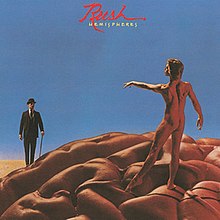Hemispheres (Rush album)
| Hemispheres | ||||
|---|---|---|---|---|
 |
||||
| Studio album by Rush | ||||
| Released | October 29, 1978 May 6, 1997 (Remastered CD) |
|||
| Recorded | June–July 1978 | |||
| Studio | Rockfield Studios in South Wales, UK | |||
| Genre | Progressive rock | |||
| Length | 36:08 | |||
| Label |
Anthem (Canada) Atlantic (Japan) Epic/Sony (Japan) Mercury |
|||
| Producer | Rush and Terry Brown | |||
| Rush chronology | ||||
|
||||
| Singles from Hemispheres | ||||
|
||||
| Professional ratings | |
|---|---|
| Review scores | |
| Source | Rating |
| AllMusic | |
| Rolling Stone | (favourable) |
| Sputnikmusic | |
Hemispheres is the sixth studio album by Canadian rock band Rush, released in 1978. The album was recorded at Rockfield Studios in Wales and mixed at Trident Studios in London. It was the last of two albums they would record in the United Kingdom before returning to their homes in Canada.
Following themes going back to Rush's third album, Caress of Steel, on Hemispheres lyricist Neil Peart continued to utilize fantasy and science fiction motifs. Similar to their 1976 release, 2112, the title track on Hemispheres takes up the entire first side of the album, and is a suite of songs telling a story - in this case, a continuation of the story begun in "Cygnus X-1 Book I: The Voyage" on the band's previous album A Farewell to Kings. The second side consists of two conventional tracks, "Circumstances" and "The Trees," and the band's first standalone instrumental, "La Villa Strangiato." According to drummer Neil Peart, they spent more time recording "La Villa Strangiato" than they did recording the entire Fly by Night album.
The album contains examples of Rush's adherence to progressive rock standards including the use of fantasy lyrics, multi-movement song structures, and complex rhythms and time signatures. In the 2010 documentary film Rush: Beyond the Lighted Stage, the band members comment that the stress of recording Hemispheres was a major factor in their decision to start moving away from suites and long-form pieces in their songwriting. That change in philosophy would manifest itself in the band's next album, the considerably more accessible Permanent Waves. The band's seventh album would mark their commercial success, paving the way for the multi-platinum Moving Pictures.
...
Wikipedia
